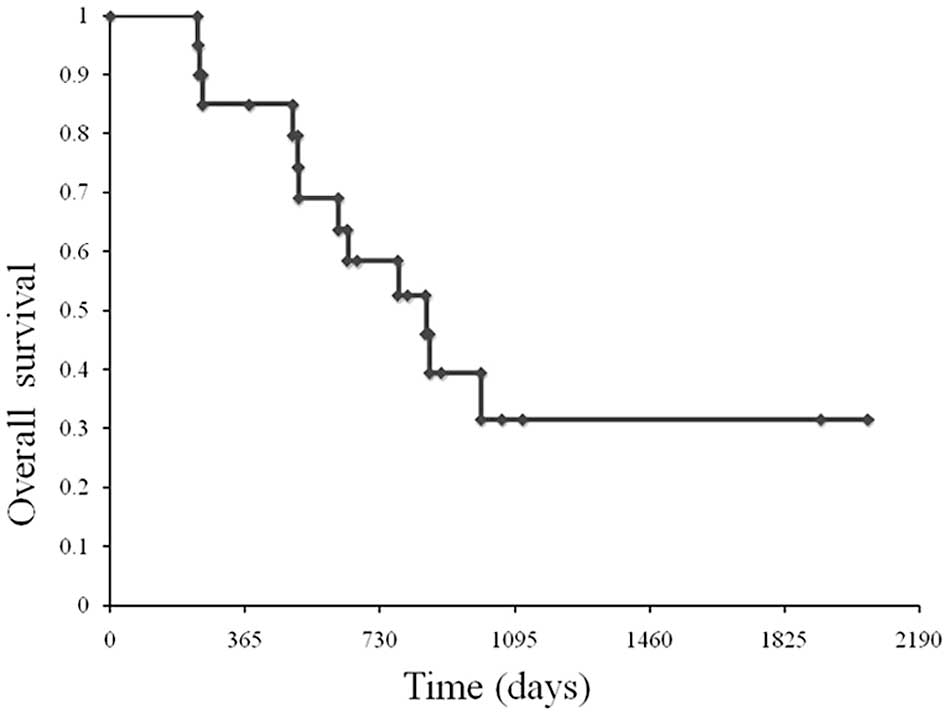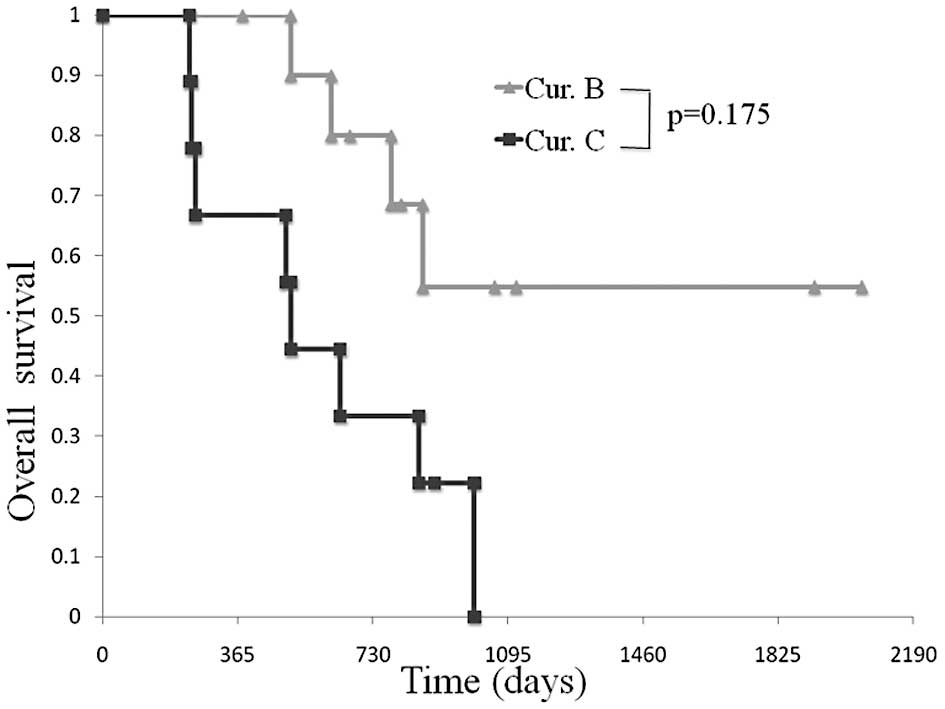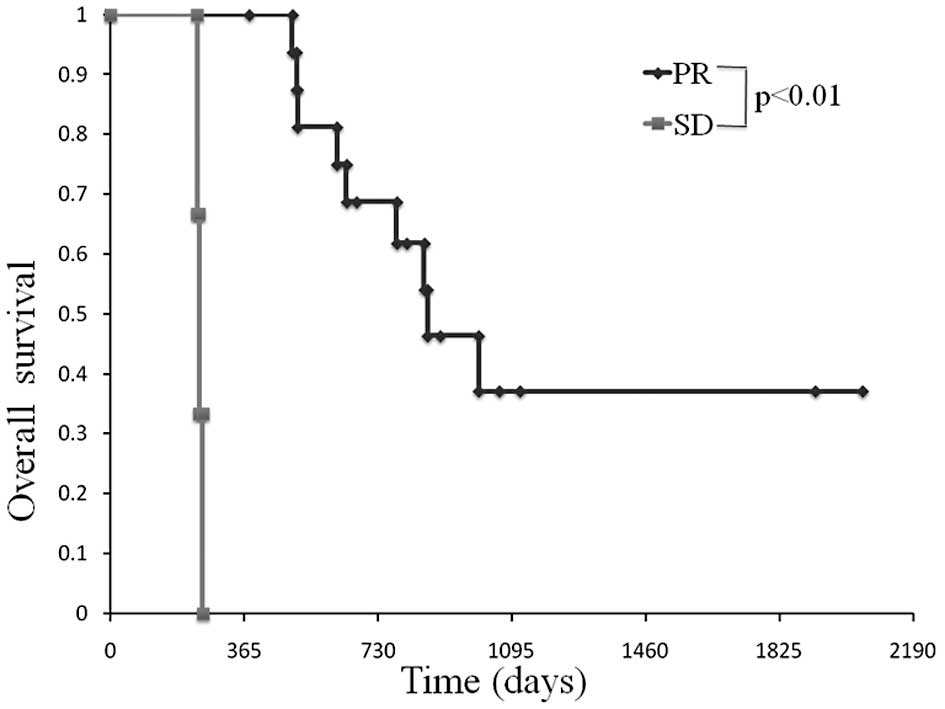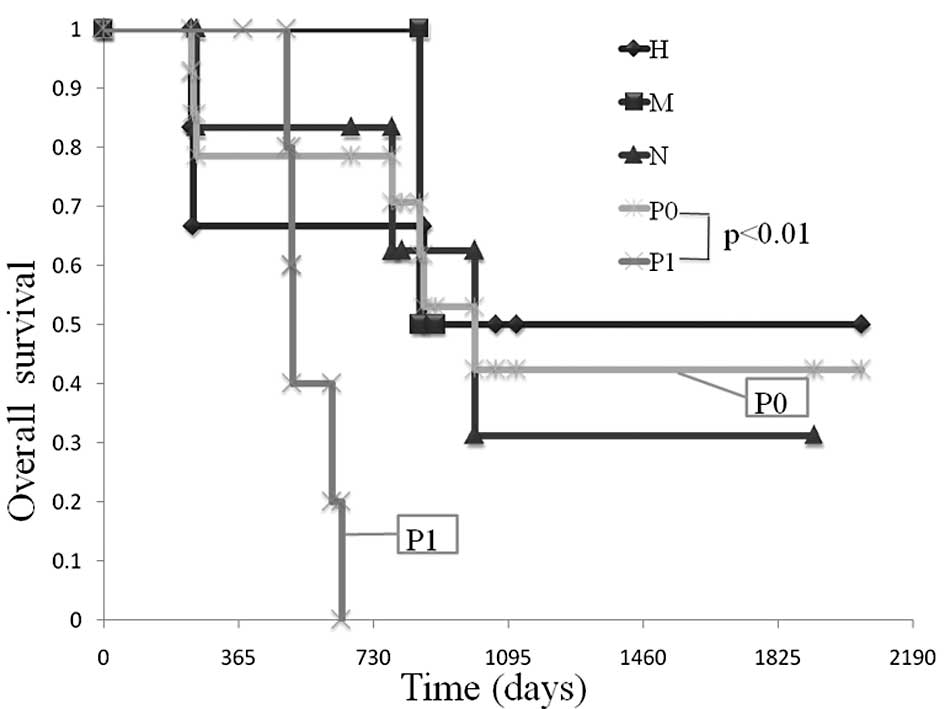|
1
|
Kamangar F, Dores GM and Anderson WF:
Patterns of cancer incidence, mortality, and prevalence across five
continents: defining priorities to reduce cancer disparities in
different geographic regions of the world. J Clin Oncol.
24:2137–2150. 2006. View Article : Google Scholar
|
|
2
|
Inoue M and Tsugane S: Epidemiology of
gastric cancer in Japan. Postgrad Med J. 81:419–424. 2005.
View Article : Google Scholar
|
|
3
|
Murad AM, Santiago FF, Petroianu A, Rocha
PR, Rodrigues MA and Rausch M: Modified therapy with
5-fluorouracil, doxorubicin, and methotrexate in advanced gastric
cancer. Cancer. 72:37–41. 1993. View Article : Google Scholar : PubMed/NCBI
|
|
4
|
Glimelius B, Ekstrom K, Hoffman K, et al:
Randomized comparison between chemotherapy plus best supportive
care with best supportive care in advanced gastric cancer. Ann
Oncol. 8:163–168. 1997. View Article : Google Scholar : PubMed/NCBI
|
|
5
|
MacDonald JS, Schein PS, Woolley PV, et
al: 5-fluorouracil, doxorubicin, and mitomycin (fam) combination
chemotherapy for advanced gastric cancer. Ann Intern Med.
93:533–536. 1980. View Article : Google Scholar : PubMed/NCBI
|
|
6
|
Findlay M, Cunningham D, Norman A, et al:
A phase II study in advanced gastro-esophageal cancer using
epirubicin and cisplatin in combination with continuous infusion
5-fluorouracil (ECF). Ann Oncol. 5:609–616. 1994.PubMed/NCBI
|
|
7
|
Ohtsu A, Shimada Y, Shirao K, et al:
Randomized phase III trial of fluorouracil alone vs. fluorouracil
plus cisplatin vs uracil and tegafur plus mitomycin in patients
with unresectable, advanced gastric cancer: the Japan Clinical
Oncology Group Study (JCOG9205). J Clin Oncol. 21:54–59. 2003.
View Article : Google Scholar : PubMed/NCBI
|
|
8
|
Koizumi W, Narahara H, Hara T, et al: S-1
plus cisplatin vs. S-1 alone for first-line treatment of advanced
gastric cancer (SPIRITS trial): A phase III trial. Lancet Oncol.
9:215–221. 2008. View Article : Google Scholar : PubMed/NCBI
|
|
9
|
Boku N, Yamamoto S, Fukuda H, et al:
Fluorouracil vs. combination of irinotecan plus cisplatin vs S-1 in
metastatic gastric cancer: a randomised phase 3 study. Lancet
Oncol. 10:1063–1069. 2009. View Article : Google Scholar : PubMed/NCBI
|
|
10
|
Einzig AI, Neuberg D, Remick SC, et al:
Phase II trial of docetaxel (taxotere) in patients with
adenocarcinoma of the upper gastrointestinal tract previously
untreated with cytotoxic chemotherapy: the Eastern Cooperative
Oncology Group (ECOG) results of protocol e1293. Med Oncol.
13:87–93. 1996. View Article : Google Scholar
|
|
11
|
Thuss-Patience PC, Kretzschmar A and
Reichardt P: Docetaxel in the treatment of gastric cancer. Future
Oncol. 2:603–620. 2006. View Article : Google Scholar
|
|
12
|
Fushida S, Fujimura T, Oyama K, Yagi Y,
Kinoshita J and Ohta T: Feasibility and efficacy of preoperative
chemotherapy with docetaxel, cisplatin and S-1 in gastric cancer
patients with para-aortic lymph node metastases. Anticancer Drugs.
20:752–756. 2009. View Article : Google Scholar : PubMed/NCBI
|
|
13
|
Zang DY, Yang DH, Kim MJ, et al:
Dose-finding study of docetaxel, oxaliplatin, and S-1 for patients
with advanced gastric cancer. Cancer Chemother Pharmacol.
64:877–883. 2009. View Article : Google Scholar : PubMed/NCBI
|
|
14
|
Yoshida K, Hirabayashi N, Takiyama W, et
al: Phase I study of combination therapy with S-1 and docetaxel
(TXT) for advanced or recurrent gastric cancer. Anticancer Res.
24:1843–1851. 2004.PubMed/NCBI
|
|
15
|
Yoshida K, Ninomiya M, Takakura N, et al:
Phase II study of docetaxel and S-1 combination therapy for
advanced or recurrent gastric cancer. Clin Cancer Res.
12:3402–3407. 2006. View Article : Google Scholar : PubMed/NCBI
|
|
16
|
Suzuki T, Yoshida K, Tanabe K, et al:
Three advanced gastric cancer patients successfully treated by
combination therapy of docetaxel and TS-1. Gan To Kagaku Ryoho.
32:509–513. 2005.PubMed/NCBI
|
|
17
|
Tsutani Y, Ohara M, Suzuki T, et al:
Docetaxel and S-1 as a first-line treatment in patients with
advanced or recurrent gastric cancer. Anticancer Res. 29:2775–2779.
2009.PubMed/NCBI
|
|
18
|
Eisenhauer EA, Therasse P, Bogaerts J, et
al: New response evaluation criteria in solid tumours: revised
RECIST guideline (version 1.1). Eur J Cancer. 45:228–247. 2009.
View Article : Google Scholar
|
|
19
|
Japanese Gastric Cancer Association.
Japanese classification of gastric carcinoma - 2nd english edition.
Gastric Cancer. 1:10–24. 1998. View Article : Google Scholar : PubMed/NCBI
|
|
20
|
Trotti A, Colevas AD, Setser A, et al:
CTCAE v3.0: development of a comprehensive grading system for the
adverse effects of cancer treatment. Semin Radiat Oncol.
13:176–181. 2003. View Article : Google Scholar
|
|
21
|
Tanabe K, Yoshida K, Hamai Y, et al:
Clinical study of TS-1 for inoperative and recurrent gastric cancer
and evaluation of long survival cases. Gan To Kagaku Ryoho.
32:1145–1148. 2005.PubMed/NCBI
|
|
22
|
Van Den Neste E, de Valeriola D, Kerger J,
et al: A phase I and pharmacokinetic study of docetaxel
administered in combination with continuous intravenous infusion of
5-fluorouracil in patients with advanced solid tumors. Clin Cancer
Res. 6:64–71. 2000.PubMed/NCBI
|
|
23
|
Takahashi I, Emi Y, Kakeji Y, Uchida J,
Fukushima M and Maehara Y: Increased antitumor activity in combined
treatment TS-1 and docetaxel. A preclinical study using gastric
cancer xenografts. Oncology. 68:130–137. 2005. View Article : Google Scholar : PubMed/NCBI
|
|
24
|
Wada Y, Yoshida K, Suzuki T, et al:
Synergistic effects of docetaxel and S-1 by modulating the
expression of metabolic enzymes of 5-fluorouracil in human gastric
cancer cell lines. Int J Cancer. 119:783–791. 2006. View Article : Google Scholar : PubMed/NCBI
|
|
25
|
Koizumi W, Tanabe S, Saigenji K, et al:
Phase I/II study of S-1 combined with cisplatin in patients with
advanced gastric cancer. Br J Cancer. 89:2207–2212. 2003.
View Article : Google Scholar : PubMed/NCBI
|
|
26
|
Nakajima T, Ota K, Ishihara S, et al:
Combined intensive chemotherapy and radical surgery for incurable
gastric cancer. Ann Surg Oncol. 4:203–208. 1997. View Article : Google Scholar : PubMed/NCBI
|
|
27
|
Chua YJ and Cunningham D: The UK NCRI
MAGIC trial of perioperative chemotherapy in resectable gastric
cancer: implications for clinical practice. Ann Surg Oncol.
14:2687–2690. 2007. View Article : Google Scholar : PubMed/NCBI
|
|
28
|
Alexander HR, Grem JL, Pass HI, et al:
Neoadjuvant chemotherapy for locally advanced gastric
adenocarcinoma. Oncology (Williston Park). 7:37–53. 1993.PubMed/NCBI
|


















